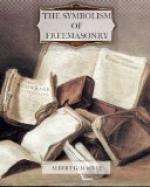Yet it cannot be denied, that since the advent of Christianity a Christian element has been almost imperceptibly infused into the masonic system, at least among Christian Masons. This has been a necessity; for it is the tendency of every predominant religion to pervade with its influences all that surrounds it, or is about it, whether religious, political, or social. This arises from a need of the human heart. To the man deeply imbued with the spirit of his religion there is an almost unconscious desire to accommodate and adapt all the business and the amusements of life, the labors and the employments of his every-day existence, to the indwelling faith of his soul.
The Christian Mason, therefore, while acknowledging and justly appreciating the great doctrines taught in Masonry, and while grateful that these doctrines were preserved in the bosom of his ancient order at a time when they were unknown to the multitudes of the surrounding nations, is still anxious to give to them a Christian character, to invest them, in some measure, with the peculiarities of his own creed, and to bring the interpretation of their symbolism more nearly home to his own religious sentiments.
The feeling is an instinctive one, belonging to the noblest aspirations of our human nature; and hence we find Christian masonic writers indulging in it almost to an unwarrantable excess, and by the extent of their sectarian interpretations materially affecting the cosmopolitan character of the institution.
This tendency to Christianization has, in some instances, been so universal, and has prevailed for so long a period, that certain symbols and myths have been, in this way, so deeply and thoroughly imbued with the Christian element as to leave those who have not penetrated into the cause of this peculiarity, in doubt whether they should attribute to the symbol an ancient or a modern and Christian origin.
As an illustration of the idea here advanced, and as a remarkable example of the result of a gradually Christianized interpretation of a masonic symbol, I will refer to the subordinate myth (subordinate, I mean, to the great legend of the Builder), which relates the circumstances connected with the grave upon “the brow of a small hill near Mount Moriah.”




